- Home
- Virginia Woolf
Complete Works of Virginia Woolf
Complete Works of Virginia Woolf Read online
The Complete Works of
VIRGINIA WOOLF
(1882-1941)
Contents
The Novels
THE VOYAGE OUT
NIGHT AND DAY
JACOB’S ROOM
MRS. DALLOWAY
TO THE LIGHTHOUSE
ORLANDO
THE WAVES
FLUSH
THE YEARS
BETWEEN THE ACTS
The Short Stories
LIST OF SHORT STORIES IN CHRONOLOGICAL ORDER
LIST OF SHORT STORIES IN ALPHABETICAL ORDER
The Play
FRESHWATER
The Non-Fiction
THE COMMON READER: FIRST SERIES
THE COMMON READER: SECOND SERIES
A ROOM OF ONE’S OWN
LONDON ESSAYS
WALTER SICKERT: A CONVERSATION
THREE GUINEAS
THE DEATH OF THE MOTH AND OTHER ESSAYS
THE MOMENT AND OTHER ESSAYS
ROGER FRY: A BIOGRAPHY
ON BEING ILL
THE CAPTAIN’S DEATH BED AND OTHER ESSAYS
GRANITE AND RAINBOW
BOOKS AND PORTRAITS
WOMEN AND WRITING
UNCOLLECTED ESSAYS
The Essays
LIST OF ESSAYS AND REVIEWS IN CHRONOLOGICAL ORDER
LIST OF ESSAYS AND REVIEWS IN ALPHABETICAL ORDER
The Memoirs
MOMENTS OF BEING
WRITER’S DIARY
The Delphi Classics Catalogue
© Delphi Classics 2014
Version 8
The Complete Works of
VIRGINIA WOOLF
By Delphi Classics, 2014
COPYRIGHT
Complete Works of Virginia Woolf
First published in the United Kingdom in 2014 by Delphi Classics.
© Delphi Classics, 2014.
All rights reserved. No part of this publication may be reproduced, stored in a retrieval system, or transmitted, in any form or by any means, without the prior permission in writing of the publisher, nor be otherwise circulated in any form other than that in which it is published.
Delphi Classics
is an imprint of
Delphi Publishing Ltd
Hastings, East Sussex
United Kingdom
Contact: [email protected]
www.delphiclassics.com
Parts Edition Now Available!
Love reading Virginia Woolf?
Did you know you can now purchase the Delphi Classics Parts Edition of this author and enjoy all the novels, plays, non-fiction books and other works as individual eBooks? Now, you can select and read individual novels etc. and know precisely where you are in an eBook. You will also be able to manage space better on your eReading devices.
The Parts Edition is only available direct from the Delphi Classics website.
For more information about this exciting new format and to try free Parts Edition downloads, please visit this link.
Explore Modernist literature with Delphi Classics
For the first time in publishing history, Delphi Classics is proud to offer the complete works of these modernist masters.
www.delphiclassics.com
The Novels
Woolf’s birthplace — 22 Hyde Park Gate, Kensington, London
Virginia Woolf’s father, Leslie Stephen (1832-1904) was an author, critic and mountaineer.
Woolf’s mother, Julia Prinsep Duckworth (née Jackson) (1846–1895) was a renowned beauty, born in British India to Dr. John and Maria Pattle Jackson. She was also the niece of the photographer Julia Margaret Cameron and first cousin of the temperance leader Lady Henry Somerset. Julia moved to England with her mother, where she served as a model for Pre-Raphaelite painters such as Edward Burne-Jones.
Julia Stephen with her daughter Virginia
Woolf with her father in 1902
THE VOYAGE OUT
First published in England in 1915 by Duckworth and in the USA in 1920 by Doran, The Voyage Out was Woolf’s debut novel. She had begun to compose the novel as early as 1910, completing an early version in 1912, which was significantly different from the final 1915 edition. However, Woolf was suffering from deep and debilitating mental and psychological difficulties during this period and found producing the work incredibly strenuous. The novel underwent several serious revisions before its publication and in 1981 Woolf scholar Louise A. Desalvo released a version of the book as it might have been in 1912, under the original title Melymbrosia. Desalvo worked on the project for more than seven years, painstakingly attempting to reconstruct the novel as Woolf had first imagined it. According to Desalvo the original text contained a far stronger political strain which dealt with the topics of colonialism, homosexuality and women’s rights. However, Woolf was advised by her friends and colleagues that it was much too early in a career to publish a work so critical of Britain and the author duly altered the work to create a novel that lacked the political and social edge she had originally intended.
The narrative centres on Rachel Vinrace, who travels to South America on her father’s ship and undergoes a voyage of self-discovery and personal enlightenment, all within a mythical framework. In the text, Woolf is able to cast a keen eye on Edwardian life and satirise elements of society while also focusing on the themes of sexuality and death. It is arguable that Woolf based Vinrace on herself and that Rachel’s journey and development mirrors the author’s voyage from a sheltered and non-stimulating childhood to the intellectual, creative and personal freedom that she found amongst her contemporaries in the Bloomsbury Group. The Voyage Out is an intriguing and exciting novel that more than hints at the considerable talent of the author.
The first edition
CONTENTS
Chapter I
Chapter II
Chapter III
Chapter IV
Chapter V
Chapter VI
Chapter VII
Chapter VIII
Chapter IX
Chapter X
Chapter XI
Chapter XII
Chapter XIII
Chapter XIV
Chapter XV
Chapter XVI
Chapter XVII
Chapter XVIII
Chapter XIX
Chapter XX
Chapter XXI
Chapter XXII
Chapter XXIII
Chapter XXIV
Chapter XXV
Chapter XXVI
Chapter XXVII
The first American edition
Woolf, aged 20
Chapter I
As the streets that lead from the Strand to the Embankment are very narrow, it is better not to walk down them arm-in-arm. If you persist, lawyers’ clerks will have to make flying leaps into the mud; young lady typists will have to fidget behind you. In the streets of London where beauty goes unregarded, eccentricity must pay the penalty, and it is better not to be very tall, to wear a long blue cloak, or to beat the air with your left hand.
One afternoon in the beginning of October when the traffic was becoming brisk a tall man strode along the edge of the pavement with a lady on his arm. Angry glances struck upon their backs. The small, agitated figures — for in comparison with this couple most people looked small — decorated with fountain pens, and burdened with despatch-boxes, had appointments to keep, and drew a weekly salary, so that there was some reason for the unfriendly stare which was bestowed upon Mr. Ambrose’s height and upon Mrs. Ambrose’s cloak. But some enchantment had put both man and woman beyond the reach of malice and unpopularity. In his guess one might guess from the moving lips that it was thought; and in hers from the eyes fix
ed stonily straight in front of her at a level above the eyes of most that it was sorrow. It was only by scorning all she met that she kept herself from tears, and the friction of people brushing past her was evidently painful. After watching the traffic on the Embankment for a minute or two with a stoical gaze she twitched her husband’s sleeve, and they crossed between the swift discharge of motor cars. When they were safe on the further side, she gently withdrew her arm from his, allowing her mouth at the same time to relax, to tremble; then tears rolled down, and leaning her elbows on the balustrade, she shielded her face from the curious. Mr. Ambrose attempted consolation; he patted her shoulder; but she showed no signs of admitting him, and feeling it awkward to stand beside a grief that was greater than his, he crossed his arms behind him, and took a turn along the pavement.
The embankment juts out in angles here and there, like pulpits; instead of preachers, however, small boys occupy them, dangling string, dropping pebbles, or launching wads of paper for a cruise. With their sharp eye for eccentricity, they were inclined to think Mr. Ambrose awful; but the quickest witted cried “Bluebeard!” as he passed. In case they should proceed to tease his wife, Mr. Ambrose flourished his stick at them, upon which they decided that he was grotesque merely, and four instead of one cried “Bluebeard!” in chorus.
Although Mrs. Ambrose stood quite still, much longer than is natural, the little boys let her be. Some one is always looking into the river near Waterloo Bridge; a couple will stand there talking for half an hour on a fine afternoon; most people, walking for pleasure, contemplate for three minutes; when, having compared the occasion with other occasions, or made some sentence, they pass on. Sometimes the flats and churches and hotels of Westminster are like the outlines of Constantinople in a mist; sometimes the river is an opulent purple, sometimes mud-coloured, sometimes sparkling blue like the sea. It is always worth while to look down and see what is happening. But this lady looked neither up nor down; the only thing she had seen, since she stood there, was a circular iridescent patch slowly floating past with a straw in the middle of it. The straw and the patch swam again and again behind the tremulous medium of a great welling tear, and the tear rose and fell and dropped into the river. Then there struck close upon her ears —
Lars Porsena of Clusium
By the nine Gods he swore —
and then more faintly, as if the speaker had passed her on his walk —
That the Great House of Tarquin
Should suffer wrong no more.
Yes, she knew she must go back to all that, but at present she must weep. Screening her face she sobbed more steadily than she had yet done, her shoulders rising and falling with great regularity. It was this figure that her husband saw when, having reached the polished Sphinx, having entangled himself with a man selling picture postcards, he turned; the stanza instantly stopped. He came up to her, laid his hand on her shoulder, and said, “Dearest.” His voice was supplicating. But she shut her face away from him, as much as to say, “You can’t possibly understand.”
As he did not leave her, however, she had to wipe her eyes, and to raise them to the level of the factory chimneys on the other bank. She saw also the arches of Waterloo Bridge and the carts moving across them, like the line of animals in a shooting gallery. They were seen blankly, but to see anything was of course to end her weeping and begin to walk.
“I would rather walk,” she said, her husband having hailed a cab already occupied by two city men.
The fixity of her mood was broken by the action of walking. The shooting motor cars, more like spiders in the moon than terrestrial objects, the thundering drays, the jingling hansoms, and little black broughams, made her think of the world she lived in. Somewhere up there above the pinnacles where the smoke rose in a pointed hill, her children were now asking for her, and getting a soothing reply. As for the mass of streets, squares, and public buildings which parted them, she only felt at this moment how little London had done to make her love it, although thirty of her forty years had been spent in a street. She knew how to read the people who were passing her; there were the rich who were running to and from each others’ houses at this hour; there were the bigoted workers driving in a straight line to their offices; there were the poor who were unhappy and rightly malignant. Already, though there was sunlight in the haze, tattered old men and women were nodding off to sleep upon the seats. When one gave up seeing the beauty that clothed things, this was the skeleton beneath.
A fine rain now made her still more dismal; vans with the odd names of those engaged in odd industries — Sprules, Manufacturer of Saw-dust; Grabb, to whom no piece of waste paper comes amiss — fell flat as a bad joke; bold lovers, sheltered behind one cloak, seemed to her sordid, past their passion; the flower women, a contented company, whose talk is always worth hearing, were sodden hags; the red, yellow, and blue flowers, whose heads were pressed together, would not blaze. Moreover, her husband walking with a quick rhythmic stride, jerking his free hand occasionally, was either a Viking or a stricken Nelson; the sea-gulls had changed his note.
“Ridley, shall we drive? Shall we drive, Ridley?”
Mrs. Ambrose had to speak sharply; by this time he was far away.
The cab, by trotting steadily along the same road, soon withdrew them from the West End, and plunged them into London. It appeared that this was a great manufacturing place, where the people were engaged in making things, as though the West End, with its electric lamps, its vast plate-glass windows all shining yellow, its carefully-finished houses, and tiny live figures trotting on the pavement, or bowled along on wheels in the road, was the finished work. It appeared to her a very small bit of work for such an enormous factory to have made. For some reason it appeared to her as a small golden tassel on the edge of a vast black cloak.
Observing that they passed no other hansom cab, but only vans and waggons, and that not one of the thousand men and women she saw was either a gentleman or a lady, Mrs. Ambrose understood that after all it is the ordinary thing to be poor, and that London is the city of innumerable poor people. Startled by this discovery and seeing herself pacing a circle all the days of her life round Picadilly Circus she was greatly relieved to pass a building put up by the London County Council for Night Schools.
“Lord, how gloomy it is!” her husband groaned. “Poor creatures!”
What with the misery for her children, the poor, and the rain, her mind was like a wound exposed to dry in the air.
At this point the cab stopped, for it was in danger of being crushed like an egg-shell. The wide Embankment which had had room for cannonballs and squadrons, had now shrunk to a cobbled lane steaming with smells of malt and oil and blocked by waggons. While her husband read the placards pasted on the brick announcing the hours at which certain ships would sail for Scotland, Mrs. Ambrose did her best to find information. From a world exclusively occupied in feeding waggons with sacks, half obliterated too in a fine yellow fog, they got neither help nor attention. It seemed a miracle when an old man approached, guessed their condition, and proposed to row them out to their ship in the little boat which he kept moored at the bottom of a flight of steps. With some hesitation they trusted themselves to him, took their places, and were soon waving up and down upon the water, London having shrunk to two lines of buildings on either side of them, square buildings and oblong buildings placed in rows like a child’s avenue of bricks.
The river, which had a certain amount of troubled yellow light in it, ran with great force; bulky barges floated down swiftly escorted by tugs; police boats shot past everything; the wind went with the current. The open rowing-boat in which they sat bobbed and curtseyed across the line of traffic. In mid-stream the old man stayed his hands upon the oars, and as the water rushed past them, remarked that once he had taken many passengers across, where now he took scarcely any. He seemed to recall an age when his boat, moored among rushes, carried delicate feet across to lawns at Rotherhithe.
“They want bridges now,” he sai
d, indicating the monstrous outline of the Tower Bridge. Mournfully Helen regarded him, who was putting water between her and her children. Mournfully she gazed at the ship they were approaching; anchored in the middle of the stream they could dimly read her name — Euphrosyne.
Very dimly in the falling dusk they could see the lines of the rigging, the masts and the dark flag which the breeze blew out squarely behind.
As the little boat sidled up to the steamer, and the old man shipped his oars, he remarked once more pointing above, that ships all the world over flew that flag the day they sailed. In the minds of both the passengers the blue flag appeared a sinister token, and this the moment for presentiments, but nevertheless they rose, gathered their things together, and climbed on deck.
Down in the saloon of her father’s ship, Miss Rachel Vinrace, aged twenty-four, stood waiting her uncle and aunt nervously. To begin with, though nearly related, she scarcely remembered them; to go on with, they were elderly people, and finally, as her father’s daughter she must be in some sort prepared to entertain them. She looked forward to seeing them as civilised people generally look forward to the first sight of civilised people, as though they were of the nature of an approaching physical discomfort — a tight shoe or a draughty window. She was already unnaturally braced to receive them. As she occupied herself in laying forks severely straight by the side of knives, she heard a man’s voice saying gloomily:
“On a dark night one would fall down these stairs head foremost,” to which a woman’s voice added, “And be killed.”

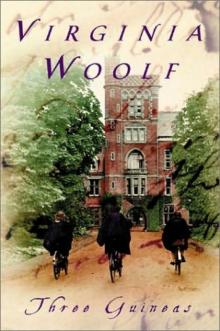 Three Guineas
Three Guineas Flush
Flush Mrs. Dalloway
Mrs. Dalloway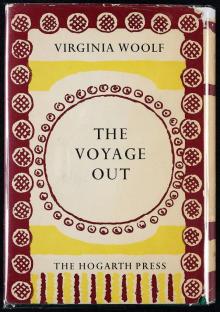 The Voyage Out
The Voyage Out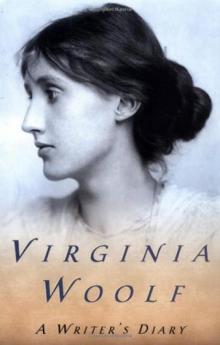 A Writer's Diary: Being Extracts From the Diary of Virginia Woolf
A Writer's Diary: Being Extracts From the Diary of Virginia Woolf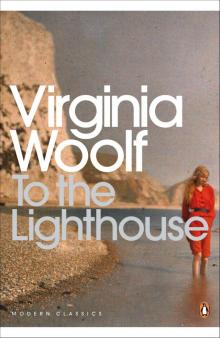 To The Lighthouse
To The Lighthouse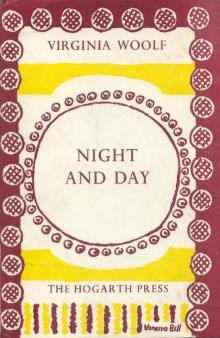 Night and Day
Night and Day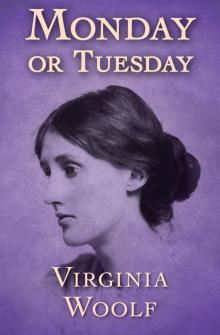 Monday or Tuesday
Monday or Tuesday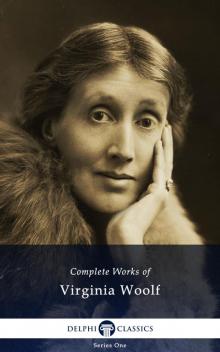 Complete Works of Virginia Woolf
Complete Works of Virginia Woolf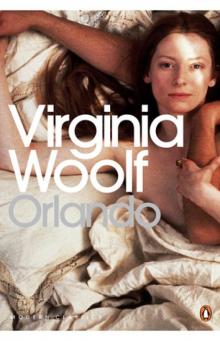 Orlando
Orlando Genius and Ink
Genius and Ink Mrs. Dalloway (Annotated)
Mrs. Dalloway (Annotated) Jacob's Room
Jacob's Room THE RUSSIAN POINT OF VIEW
THE RUSSIAN POINT OF VIEW A Writer's Diary
A Writer's Diary Woolf Short Stories
Woolf Short Stories